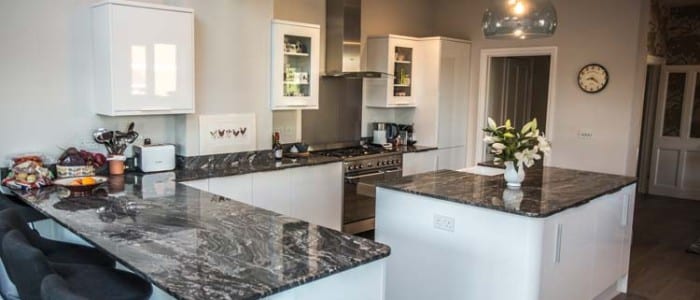When investing in a stone worktop, you want it to look pristine and perform well for years to come. One of the most common questions homeowners ask is, “Does my worktop need to be sealed?” The answer varies depending on the material, as some stones are porous and benefit from a protective sealant, while others are naturally resistant to stains and damage.
This guide will walk you through the sealing needs of different materials, dispel common myths about stone worktops, and answer frequently asked questions to ensure your worktop stays in perfect condition.
Do Worktops Need to Be Sealed?
Sealing your worktop adds a protective barrier to prevent staining, water damage, and dust build-up. However, not all materials require a sealant. Let’s take a closer look:
Granite
Granite is a porous material and does require a sealant to protect it from staining. Without sealing, spills left uncleaned can soak into the stone, resulting in unsightly stains or dark spots on your granite worktop. Regular sealing, typically once a year, will help maintain its durability and beauty.
Corian
Corian worktops do not need to be sealed because they are non-porous. This makes them highly resistant to stains and easy to maintain. However, Corian can be damaged by direct exposure to boiling water, so proper care is still essential.
Quartz
Quartz worktops are completely non-porous and do not require sealing. Manufacturers like Caesarstone, Compac, and Silestone guarantee their products will not absorb liquids or stains. In fact, applying sealant to quartz can cause a residue to sit on the surface rather than providing any additional protection.
Marble
Marble is a soft, porous stone and is highly susceptible to staining and superficial damage. Most marble worktops will benefit from a sealant, but it’s important not to overdo it. Excess sealant can create a thick, muddy layer on the surface. Always consult your supplier to determine the best approach for your specific type of marble.
Wood
Wood worktops require occasional treatments with oil or lacquer to maintain their finish and protect them from water damage, especially when used for bathroom countertops. While wood is a popular and aesthetic choice, it demands more maintenance than stone and may not be the best long-term option for high-use kitchen worktops.
How Often Should You Seal Your Worktop?
Sealants typically need to be applied once a year, but this depends on the material and how heavily the worktop is used. If you’re unsure, ask your supplier for advice or guidance tailored to your worktop.
Debunking Common Myths About Stone Worktops
There’s plenty of misinformation about natural stone worktops. Here are some common myths and the truth behind them:
“Granite contains radon gas.”
While granite may contain trace amounts of radon gas, studies show these levels are negligible—there’s more radon gas in the air outside your home than in a granite worktop.
“Granite is expensive.”
While granite is a premium material, it comes in a wide price range, and there are budget-friendly options available. Always research and consult with your supplier to find granite that fits your budget.
“Stains on marble are permanent.”
Marble is prone to staining, but most spills can be wiped away if cleaned promptly. If a stain does occur, specialized cleaning products can often restore the surface.
“Quartz is completely synthetic.”
Quartz is man-made but consists of up to 93% natural stone, combined with resins for added durability. This blend allows for an incredible range of colours and patterns, offering both natural beauty and enhanced performance.
“Granite is unhygienic.”
Granite’s porosity doesn’t make it inherently unhygienic. With proper sealing and cleaning, granite is just as hygienic as any other worktop material.
“All brands are the same.”
Not all brands are equal. High-quality brands use responsibly sourced materials and offer guarantees on their products. Always research your supplier to ensure you’re getting an authentic, high-grade product.
“Dark granite is better than light granite.”
The choice between dark and light granite is a matter of personal preference. While dark granite may be denser, there’s no significant difference in performance.
Frequently Asked Questions
Which material ages best?
All stone worktops can last for decades if properly cared for. However, sunlight, heat, and heavy usage can cause wear over time. The key to longevity is regular maintenance.
What happens if my worktop chips or cracks?
Chips or cracks are rare but can occur under extreme pressure. Minor damage can often be buffed out or repaired, but larger flaws may require replacement.
How do I clean my worktop?
Cleaning is simple—most worktops only need warm soapy water and a soft cloth. Avoid harsh cleaners on sensitive materials like marble or quartz.
Do I need to be home during the fitting?
Yes, we recommend being present for templating and fitting to ensure everything meets your expectations.
If you have further questions or need help with sealing or maintaining your worktop, contact us at 0117 332 5045 or visit our contact page. For more insights, download our Free Kitchen Worktops Buyer’s Guide.
